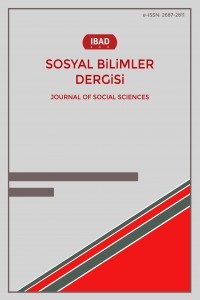AVRUPA PEYZAJ SÖZLEŞMESI GEREĞİ TARİHİ VE ARKEOLOJİK YENİ BİR YAKLAŞIM
Tarihi peyzaj değerleri, tarihsel derinlik, arkeolojik geçmiş, tarihi peyzaj karakter sınıflandırması, peyzaj mimarlığı
According to European Landscape Convention Historical and Archaeological New Approach
Historical landscape values, historical depth, archeological background, historical landscape character classification, landscape architecture,
___
- Antrop M. (2005). Why landscapes of the past are important for the future. Landscape and Urban Planning. 70(1): 21–34.APST (2007). Avrupa Peyzaj Sözlşmesinin Uygulanması Yolunda Uluslararası Katılımlı Toplantı Bildiri Kitabı, TMMOB Uluslararası Katılımlı Toplantı Sonuç Bildirgesi, Editör: Karadeniz, N., Akay, A., Demirbaş Özen, M., Mayıs, Ankara, Bildiriler Kitabı, 6-7.Aylesbury (2005). Historic Environment Assessment, Aylesbury Environs Study, Milton Keynes and Aylesbury Vale Sub Regional Strategy, pp.91.CHL (2016). Characterising Historic Landscapes: Interdisciplinary Perspectives Workshop. March 1-4, 2016, Izmir, Turkey. Demir, S. (2016). Environment Sustainability and Landscape Management, Chapter: 26, Publisher: St.Kliment Ohridski University Press, Sofia., Editors: Efe R., Curebal İ., Gad A., Toth B., pp.425-438.Demir, S. (2017). Tarihi Peyzaj ve Peyzaj Karakter DeğerlendirilmesiYaklaşımları ile Doğa Koruma-Turizm Odaklı Peyzaj Planlama: Meryemanan Vadisi Örneği, Trabzon, Doktora Tezi, Karadeniz Teknik Üniversitesi, Fen Bilimleri Enstitüsü, Trabzon.Demir, S. & Demirel Ö. (2017). Historical Landscape Classification and Assessment, Journal of International Scientific Researches, 2,2,186-195.Dixon, P. & Hingley, R. (2002): Historic land-use assessment in Scotland, in Fairclough and Rippon (eds) 2002, 85-88.Dobson S. & Selman P.(2012). Applying Historic Landscape Characterization in Spatial Planning: from Remnants to Remanence, Planning Practice ve Research, 27(4): 459-474.Ede, J. & Darlington, J. (2002). Lancashire Historic Landscape Characterisation Programme: A report on the context, method and results for the Lancashire. Blackburn with Darwen and Blackpool Areas. English Heritage, pp.172. Fairclough, G. (2014). Landscape Character assessment and Historical Landscape Characterisation: Conflicting, competing, complementary – the (un)necessary evils of disciplinary seperation. The future of landscape characterisation and the future character of landscape a seminar at KSLA, Stockholm.Fairclough, G. & Herring, P. (2016). Lens, mirror, window: interactions between Historic Landscape Characterisation and Landscape Character Assessment, Landscape Research , 41,2,186-198.Herlin, I. (2007). Avrupa Peyzaj Sözleşmesi, Genel Bir Bakış ve Sözleşmenin Uygulanması. Avrupa Peyzaj Sözleşmesinin Uygulanması Yolunda Uluslararası Katılımlı Toplantı, Mayıs, Ankara, Bildiriler Kitabı, 24-27.Herring C.P. (2009). Framing Perceptions of the Historic Landscape: Historic Landscape Characterisation (HLC) and Historic Land-Use Assessment (HLA), Scottish Geographical Journal, 125(1): 61-77.Kienast F. (1993). The Hague Analysis of historic landscape patterns with a Geographical Information System - a methodological outline, Landscape Ecology, 8(2): 103-118Lambrick G. ve Bramhill P. (1999) . Historical Landscape Assessment, Main Report, Hampshire Country Council, England. pp.39. http://www3.hants.gov.uk/hcc_historic_landscape_1-4.pdf. Lambrick,G., Hind, J. ve Wain,I. (2013). Historic Landscape Characterisation in Ireland: Best Paractice Guidance, Published by The Heritage Council, The Heritage Council of Ireland Series, pp.93. ISBN 978-1-906304-21-8LANDMAP (2013). Historic Landscape, Natural Resources Wales, LANDMAP Methodology: Guidance for Wales,.pp.23.LUC (2011). Land Use Consultant. An Assessment of the Landscape Sensitivity to Onshore Wind Energy ve Field-Scale Photovoltaic Development in Torridge District. Final Report Prepared for Torridge District Council by Land Use Consultants., pp. 230.Ortaçeşme, O. (2007). Avrupa Peyzaj Sözleşmesi Bağlamında Peyzaj Planlama, Avrupa Peyzaj Sözleşmesinin Uygulanması Yolunda Uluslararası Katılımlı Toplantı Bildiri Kitabı, 81-87, Mayıs, Ankara.Peak (2008). Peak District Landscape Character Assessment, Final Report, Peak District National Park Authory, pp.212. http://www.peakdistrict.gov.uk/.Erişim Tarihi: 06.05.2014. Shropshire (2007). Shropshire Landscape Assessment and Shropshire Historical Landscape Characterisation. Shropshire Council. https://shropshire.gov.uk/environment/shropshires-landscape/.pp.149.Şahin Ş., Perçin, H., Kurum, E., Uzun, O. & Bilgili, C. (2013). Bölge-AltBölge (İl) Ölçeğinde Peyzaj Karakter Anal,zi ve Değerlendirmesi Ulusal Teknik Kılavuzu, Müşteri Kurumlar; T.C. İçişleri Bakanlığı, T.C. Çevre ve Şehircilik Bakanlığı ve T.C. Orman ve Su İşleri Bakanlığı, Yütürücü Kuruluş; T.C. Ankara Üniversitesi ve TÜBİTAK KAMAG 1007 Programı 109G074 nolu PEYZAJ-44 Projesi.Turner S. & Crow J. (2010). Unlocking historic landscapes in the eastern Mediterranean: two pilot studies using historic landscape Characterisation, Antiquity 84: 216-229. http://antiquity.ac.uk/an:/84/ant840216.htmTurner, S. (2006). Historic Landscape Characterisation: A landscape archaeology for research, management and planning. Landscape Research, 31(4),385-398, doi: 10.1080/01426390601004376.Turner, S. (2007). Ancient country. The historic character of rural Devon. Exeter: Devon Archeological Society, 185 sayfa.UHLC (2002). Understanding Historic Landscape Character. A paper exploring the relationship between Landscape Character Assessment and Historic Landscape Characterisation/Historic Land-use Assessment, Topic Paper 5, Guidance for Scotland and England, Countryside Agency.Uzun O. (2015). Some of the Landscape Planning Approaches in the World and in Turkey. In: Environment and Ecology at the beginning of 21st century, Efe R., Curebal İ., Bizzarri C., Nyussupova G., (Ed.) Chapter 4, p.61-79, St.Kliment Ohridski University Press, Sofia.Uzun, O., İlke E.F., Çetinkaya, F. & Açıksöz, S. (2012). Peyzaj Planlama: Konya İli, Bozkır-Seydeşehir-Ahırlı- Yalıhüyük ilçeleri ve Suğla Gölü Mevkii Peyzaj Yönetimi Koruma ve Planlama Projesi, Ankara.
- Yayın Aralığı: Yılda 2 Sayı
- Başlangıç: 2016
- Yayıncı: Hayrullah KAHYA
ÜNİVERSİTE ÖĞRENCİLERİNDE ELEŞTİREL DÜŞÜNME VE AKADEMİK BAŞARI ARASINDAKİ İLİŞKİ
Fatma HASTAOĞLU, Mukadder MOLLAOĞLU, Songül MOLLAOĞLU, Esra BAŞER
ORTAÖĞRETİM ÖĞRENCİLERİNE YÖNELİK ÖZEL DERS EĞİLİM ÖLÇEĞİNİN GEÇERLİK VE GÜVENİRLİK ÇALIŞMASI
BİTCOİN’DEN SELFCOİN’E KRİPTO PARA
Hülya ÇAĞIRAN KENDİRLİ, Metin BAHADIR
ÇOCUKLARIN İZLEDİKLERİ ÇİZGİ FİLMLER VE BU TERCİHLERİNİNKARAKTERLERİ İLE İLİŞKİSİ
Lale CERRAH ÖZSEVGEÇ, Arzu SAKA
ORTALAMA YARGILAMA SÜRESİ KESTİRİMİNDE YENİ YÖNTEM ÖNERİLERİ
KORUNMAYA MUHTAÇ ÇOCUKLAR VE KORUNMAYA MUHTAÇ ÇOCUKLARA SAĞLANAN BAKIM YÖNTEMLERİ
TÜRKİYE’DE YAPILAN LİSANSÜSTÜ TEZLERDEKİ AHLAK GELİŞİMİ KAVRAMININ İNCELENMESİ
Sena KAPLAN, Halime ABAY, Esra BÜKECİK, Sevil ŞAHİN, Ayten ARIÖZ DÜZGÜN, Aysun BAY KARABULUT
